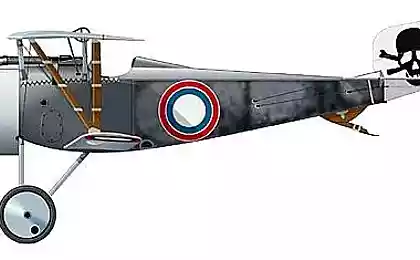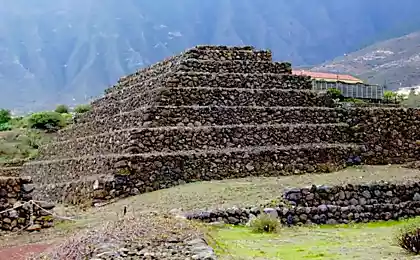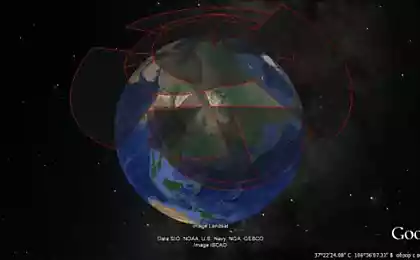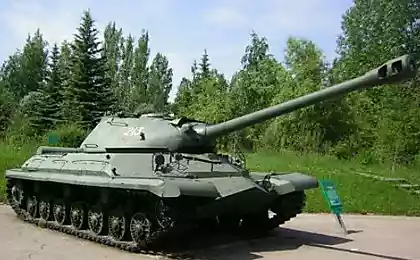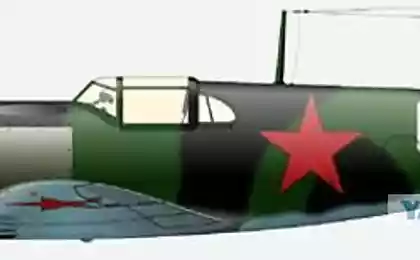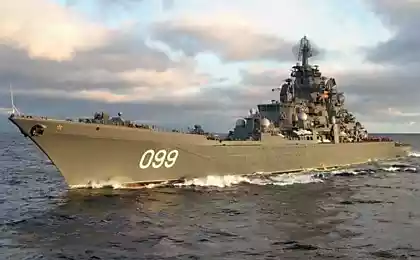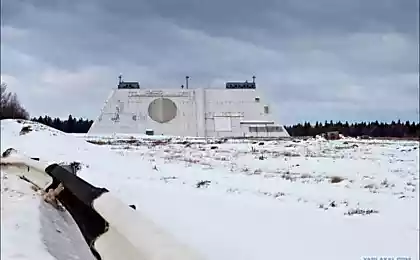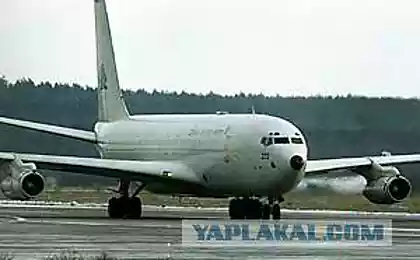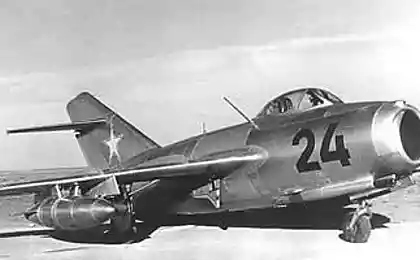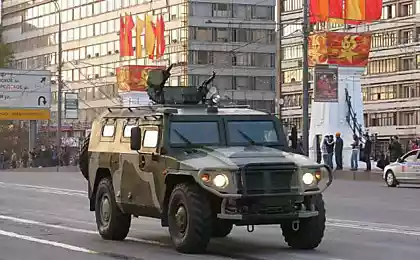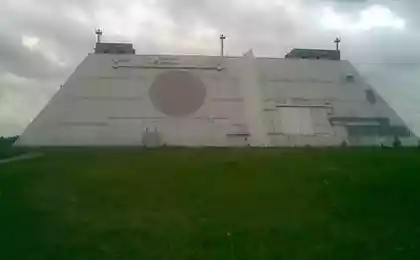1063
Eighth wonder: Russian radar
A few years ago, the planes landing at Sheremetyevo, did while approaching the Moscow small hook, skirting some forbidden zone. If in our time curious traveler closely pressed against the porthole, between Sofrino and Pushkin in clear weather may notice a gigantic structure that resembles an unfinished pyramid of Cheops. In fact, it is quite unfinished, has no analogues in the world radar "Don-2N". During the appearance, unique performance and incredible value of the military often call it the eighth wonder of the world
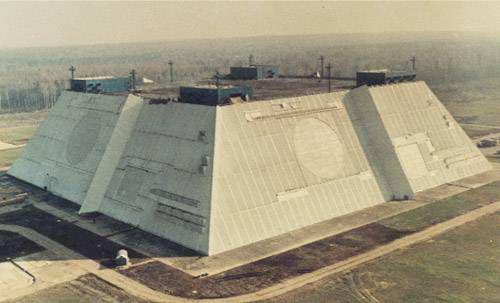
Hunters balls
a few years ago, says the chief designer of the radar Victor Sloka, in the framework of cooperation in the missile defense program, Russia and America conducted a joint experiment ODERACS.
With the US shuttle Discovery in space thrown metal balls of the target, and the most powerful in the world tried their radars detect.
Pyatnadtsatisantimetrovye sphere spotted all. Balls with a diameter of 10 centimeters saw only three radar, two Russian and American COBRA DANE radar in Alaska. Finally the ship threw two 5-centimeter ball. Discovered and built a miniature target trajectory just outside Moscow, "Don." "DON-2N" anti-missile system is the heart of Moscow. Nothing like no one else in the world, America is only planning to create something similar. The construction of the station took 32 thousand tons of steel, 50,000 tons of concrete, 20 thousand kilometers of cables, hundreds of kilometers of pipelines and 10 thousand of iron gate valves to them (for cooling equipment requires a huge amount of water). On each side, 130 meters (at the side of the pyramid of Cheops is 227 meters), the gigantic concrete structure located phased array antennas. In each of the arrays - 60 thousand emitters. They work for ten years, continuously scanning the area around Moscow at a distance of 3700 kilometers. For design, "Don-2N" must have worked for at least another thirty years.
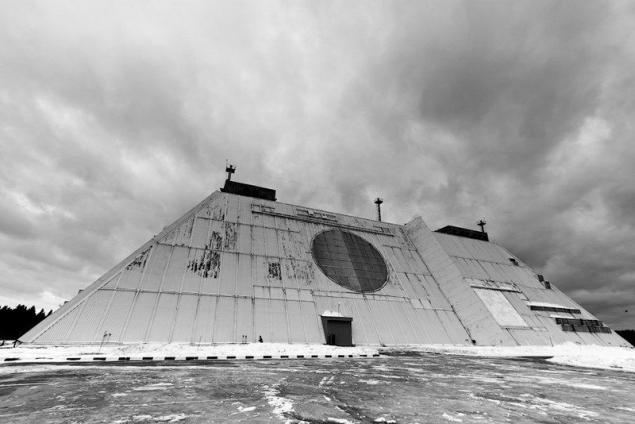
Phase shifters
A developed radiators and very grating 25 years Dmitry Zimin, then - deputy chief designer, now - the founder of the "Bee Line". "Phased array - he explains the principle of operation of radar - is a way to get the beam to rotate at a fixed antenna." Reflectors traditional radars (radar) swinging on turntables. An important advantage of phased array radar - the ability to generate multiple beams. For example, "DON" can simultaneously track 30 targets. "The idea itself is not new phased array and clear - said Zimin. - In order to swing at a fixed antenna beam must learn to tilt the front of the field. " In conventional radar front strictly perpendicular to the emitter, and in order to direct the beam, it is necessary to rotate the antenna itself. If the antenna divided into thousands of small emitters, and to teach them according to the algorithm to change the phase, then a plane wave can be put in any direction. Theoretically, these radars were calculated at the end of the Second World War, but in practice the idea rested on the extraordinary complexity of the process of creation in the microwave range of managed environments. It was tried a lot of materials: ferrites, semiconductors and even plasma - has not yet found the right solution. Historically, the first such swing beam antennas were constructed not on the basis of phase shifters, but on the principle of frequency scanning. A small change in frequency transmitter caused a phase change, and, consequently, a rapid swing beam. This is the most simple technology, and the first phased array radars operate on this principle. Antennas of different radar insufficient accuracy and monstrous in size, reaching a length of one hundred meters.
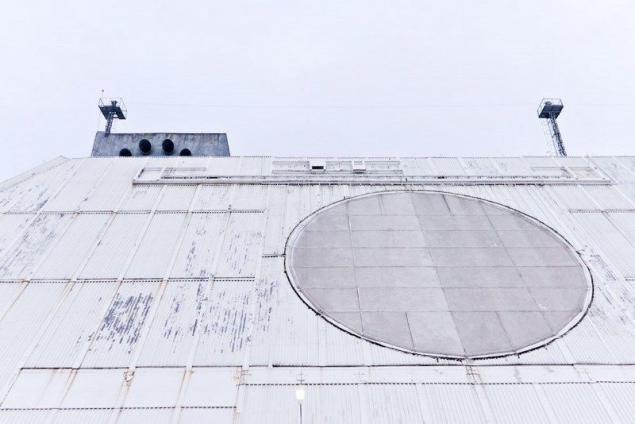
Look beyond the horizon
Prepared in 1972, the preliminary design of the national missile defense (NMD) called for the establishment of an early warning system, which should include the-horizon-horizon radar, and space systems. The-horizon radar, using the property of radio waves reflected from the Earth's ionosphere, can register with the USSR launches in the United States. Placed on the satellite sensors were to register the infrared radiation from the exhaust of a rocket engine. These tools provide the maximum possible warning time. The-horizon radar performed a simple function: they confirm flies whether we do something or not, and gave the signal for the return run. The system has reached its peak in the late 70s. With the collapse of the Union were lost radar in Skrunda (Latvia), Sevastopol and Mukachevo (Ukraine), Balkhash (Kazakhstan) suspended work Mishlevke (near Irkutsk). Externally, these radars are reminded of the well-known television footage radar in Skrunda. Now the territory of Russia cover three early warning radar - Pechora (Russia), Baranovichi (Belarus) and Gabala (Azerbaijan).
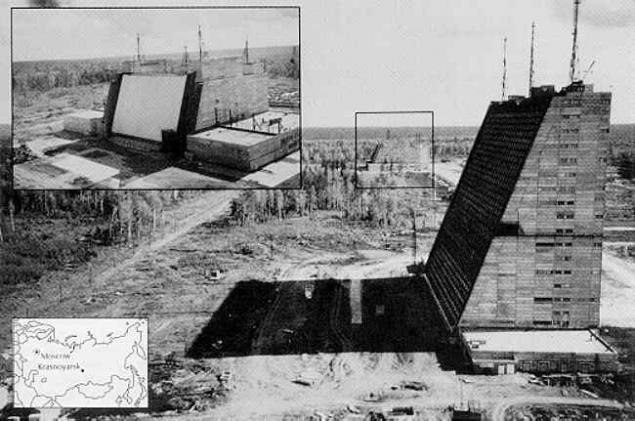
Fourth - Moscow "Don", in addition to closing the holes formed in the early warning system, performs a much more difficult task. It must be accompanied by small-sized high-speed targets (warheads), throw decoys to bypass interference and give the coordinates of the defeat. The problem is extremely complex, not for nothing that the most powerful supercomputer in the USSR "Elbrus" was designed just for the "Don" in the building it occupies almost floor. Inside the station is about a thousand cabinets only with electronic equipment. Since the task, developers have coped: "DON" allows you to define the target at distances of thousands of kilometers of optical with the precision. Designer General claims that his radar sees even a tennis ball flying over Europe at a rate of several thousand kilometers per hour. "That's just the problem itself is useless - sigh Zimin. - Each system has a finite bandwidth, and it has a "Don". Suffice one extra goal - and there is no Moscow. By and large, the problem of missile defense in the massive raid - an unsolvable problem. The Americans understood this, so their system is not deployed to protect the city, and launchers. After silos stand fi load: in order to disable them, you need a direct hit. That single unexpected start - is yes. " For such purposes, and the Americans are now trying to create a global missile defense system. After the meeting, Bush and Putin company Boeing, is responsible for the development of radars for the US program, called on the engineers "Don" with the proposal on cooperation. What came out of it, we do not know. We can only say with certainty that the tennis balls over Europe is only we can see.
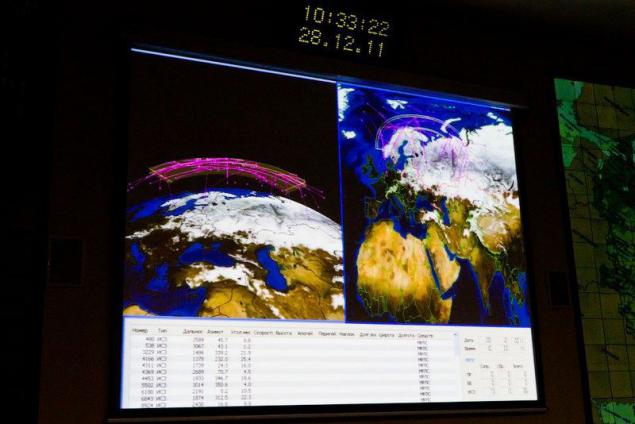
For the Moscow missile defense system deployed 7-fire complexes, which include missile silo launchers protected by a sliding cover. Two complex for 18 launchers each, armed with long-range interceptor missiles 51T6 "Azov" capable of engaging ballistic targets in near space at an altitude of 120 km and at a distance of 350 km.
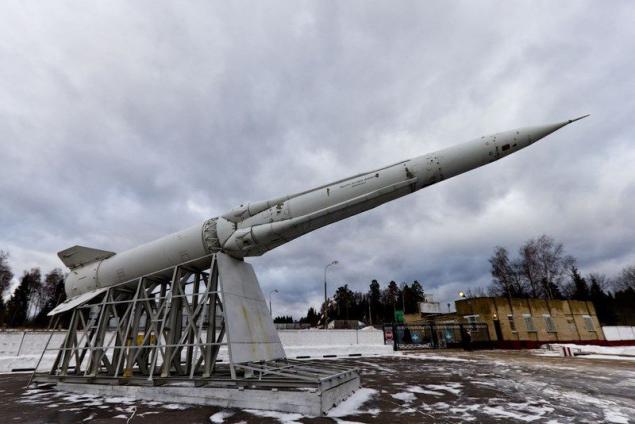
Five new launch systems deployed around Moscow, and include a total of 64 silos missiles 53T6 "Amur". Not having analogues in the world, two-stage, solid-fuel missile capable of hitting ballistic targets at altitudes up to 30 km and at a distance of 100 km. The interceptors used thermonuclear warhead capacity of 1 Mt, which allowed to shoot on a "cloud" of true and false targets. According to estimates of the American physicist Ralph Lapp, the explosion of the charge of such power would ensure the destruction of warheads, which has no special protection from the soft X-rays, in a radius of about 2 km from the explosion site. The fireball from the explosion of anti-missile will have a diameter of 2200 m, and the illumination of 10. According to specialists, while undermining the warhead at a low altitude immediately die up to 10% of the population of the capital, an electromagnetic pulse will be knocked out all the power system in the region, wired communication lines and channels of command and control, plutonium-239 will be infected 200 sq. km. According to the developers, "Don-2N" is currently missiles with thermonuclear warheads are not on duty.
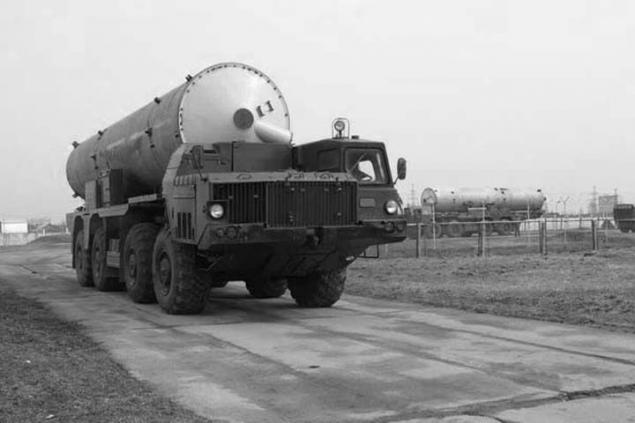
Now let's look inside the pyramid.
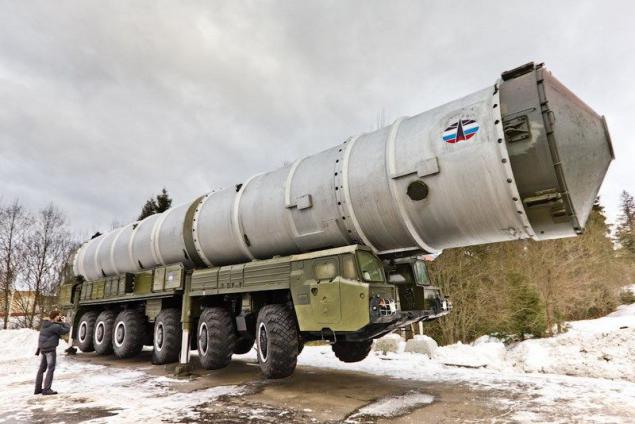
Construction takes a few floors below ground. For applications adversary WMD radars can exist completely independently. There is a shelter with a supply of food and water as well as air purification systems and autonomous power supply. The underground hall radar can fit convoy of trucks.
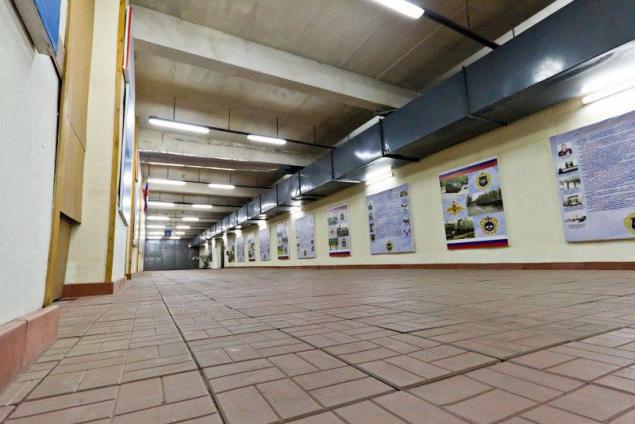
Posts combat duty on the radar.
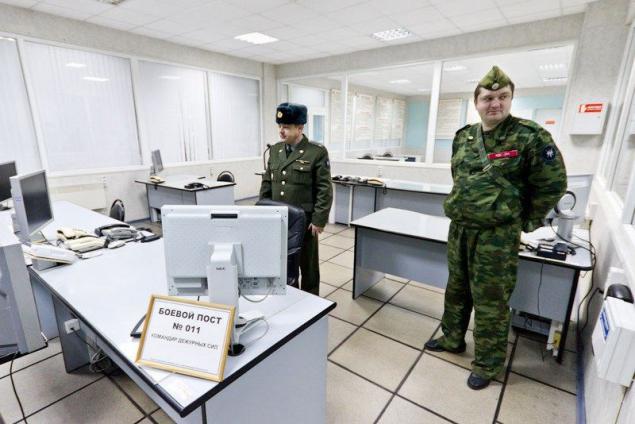
The main hall of the command post. On the screens projected maps and information about the objects detected.
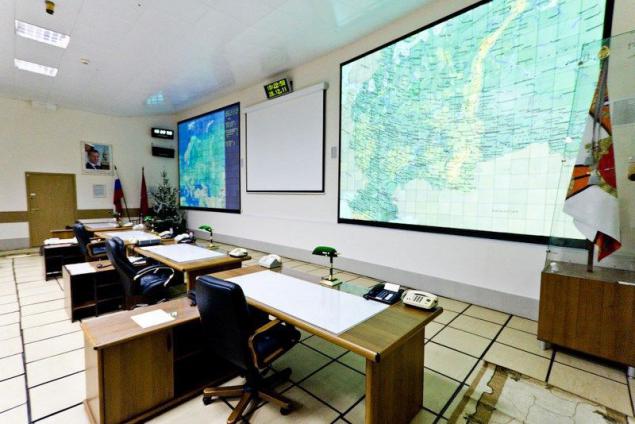
Fixed multifunction radar "Don-2N" in the Pushkin district, Moscow region.
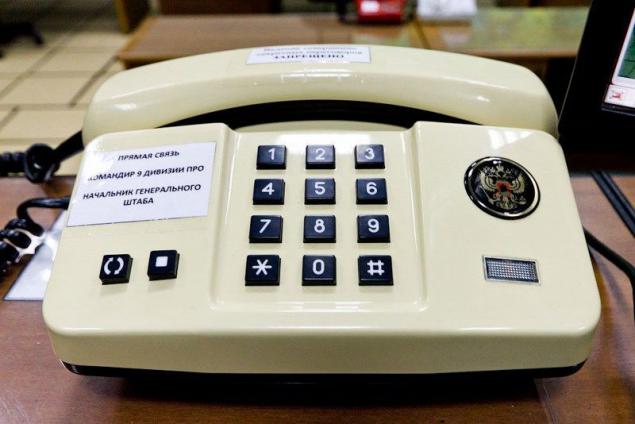
Map is divided into four parts, respectively, toward the station.
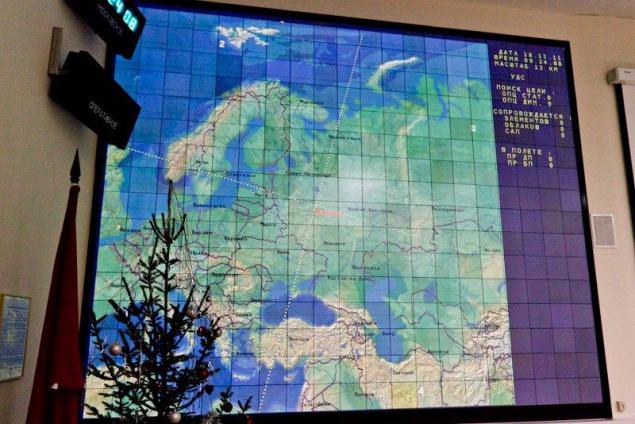
According to various reports, the station "Don-2N" may be accompanied by up to a hundred objects and to direct them to a few dozen missiles. One shift operator station is composed of a hundred people.
If there is a missile launch, our companions from the first-tier register it. Then, the radar will start to track their flight over the Arctic Ocean and bring them missiles. Undermining without causing harm to people can occur at altitudes of up to 6 kilometers. Even if the whole country is affected, there is a chance of saving Moscow.
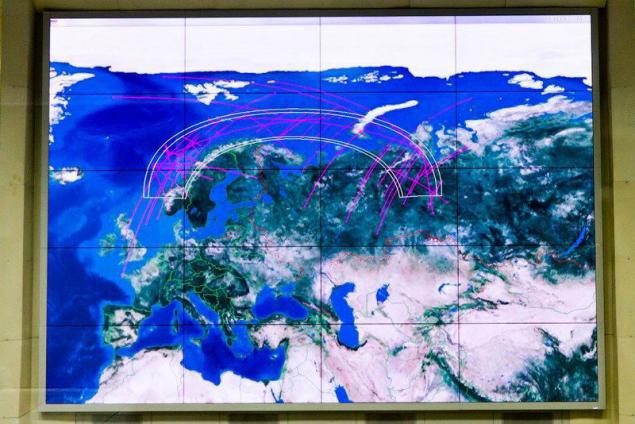
The command post radar for controlling equipment and station equipment and control its condition.
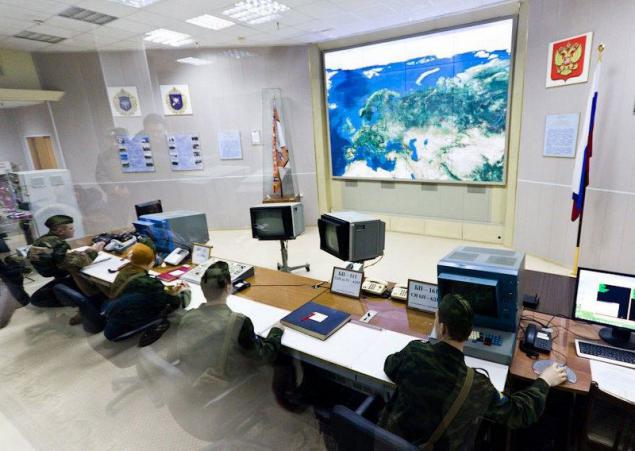
One of the four phased array antennas (PAR) radar. 72 where the emitter of microwaves, one of them is extended. They are cooled by flowing water and compressed air.
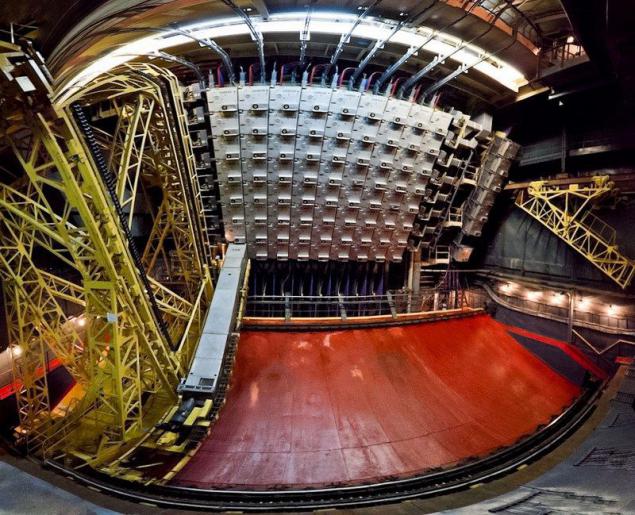
Running on rails design allowing to change the elements of the system.
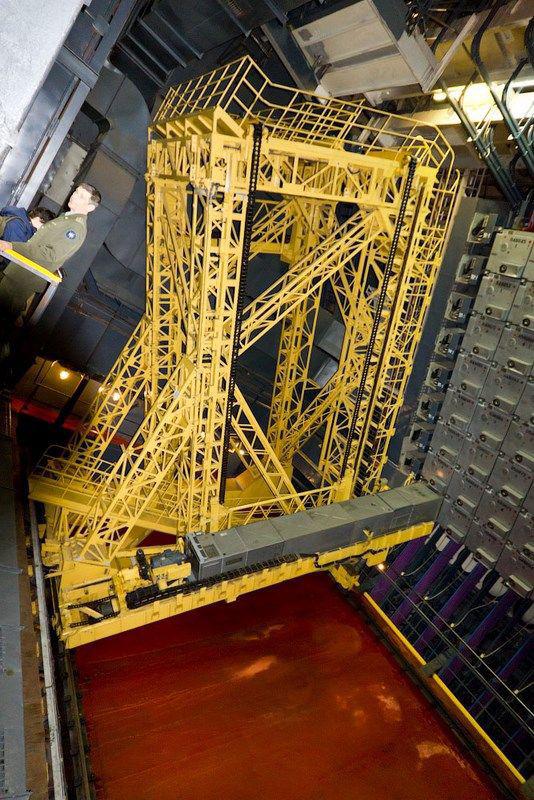
Right from the antenna there are a number of spare radiators.
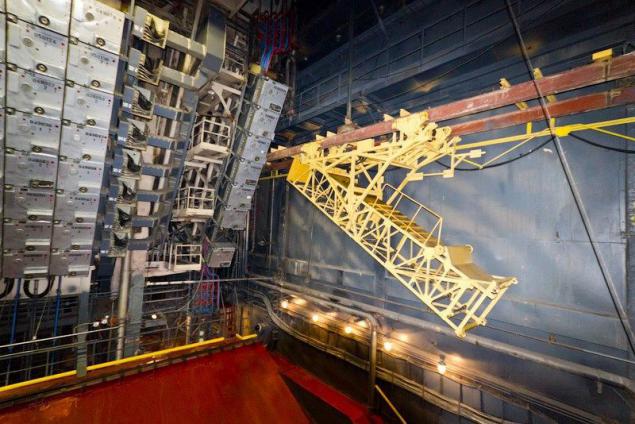
--img19--
Source:

Hunters balls
a few years ago, says the chief designer of the radar Victor Sloka, in the framework of cooperation in the missile defense program, Russia and America conducted a joint experiment ODERACS.
With the US shuttle Discovery in space thrown metal balls of the target, and the most powerful in the world tried their radars detect.
Pyatnadtsatisantimetrovye sphere spotted all. Balls with a diameter of 10 centimeters saw only three radar, two Russian and American COBRA DANE radar in Alaska. Finally the ship threw two 5-centimeter ball. Discovered and built a miniature target trajectory just outside Moscow, "Don." "DON-2N" anti-missile system is the heart of Moscow. Nothing like no one else in the world, America is only planning to create something similar. The construction of the station took 32 thousand tons of steel, 50,000 tons of concrete, 20 thousand kilometers of cables, hundreds of kilometers of pipelines and 10 thousand of iron gate valves to them (for cooling equipment requires a huge amount of water). On each side, 130 meters (at the side of the pyramid of Cheops is 227 meters), the gigantic concrete structure located phased array antennas. In each of the arrays - 60 thousand emitters. They work for ten years, continuously scanning the area around Moscow at a distance of 3700 kilometers. For design, "Don-2N" must have worked for at least another thirty years.

Phase shifters
A developed radiators and very grating 25 years Dmitry Zimin, then - deputy chief designer, now - the founder of the "Bee Line". "Phased array - he explains the principle of operation of radar - is a way to get the beam to rotate at a fixed antenna." Reflectors traditional radars (radar) swinging on turntables. An important advantage of phased array radar - the ability to generate multiple beams. For example, "DON" can simultaneously track 30 targets. "The idea itself is not new phased array and clear - said Zimin. - In order to swing at a fixed antenna beam must learn to tilt the front of the field. " In conventional radar front strictly perpendicular to the emitter, and in order to direct the beam, it is necessary to rotate the antenna itself. If the antenna divided into thousands of small emitters, and to teach them according to the algorithm to change the phase, then a plane wave can be put in any direction. Theoretically, these radars were calculated at the end of the Second World War, but in practice the idea rested on the extraordinary complexity of the process of creation in the microwave range of managed environments. It was tried a lot of materials: ferrites, semiconductors and even plasma - has not yet found the right solution. Historically, the first such swing beam antennas were constructed not on the basis of phase shifters, but on the principle of frequency scanning. A small change in frequency transmitter caused a phase change, and, consequently, a rapid swing beam. This is the most simple technology, and the first phased array radars operate on this principle. Antennas of different radar insufficient accuracy and monstrous in size, reaching a length of one hundred meters.

Look beyond the horizon
Prepared in 1972, the preliminary design of the national missile defense (NMD) called for the establishment of an early warning system, which should include the-horizon-horizon radar, and space systems. The-horizon radar, using the property of radio waves reflected from the Earth's ionosphere, can register with the USSR launches in the United States. Placed on the satellite sensors were to register the infrared radiation from the exhaust of a rocket engine. These tools provide the maximum possible warning time. The-horizon radar performed a simple function: they confirm flies whether we do something or not, and gave the signal for the return run. The system has reached its peak in the late 70s. With the collapse of the Union were lost radar in Skrunda (Latvia), Sevastopol and Mukachevo (Ukraine), Balkhash (Kazakhstan) suspended work Mishlevke (near Irkutsk). Externally, these radars are reminded of the well-known television footage radar in Skrunda. Now the territory of Russia cover three early warning radar - Pechora (Russia), Baranovichi (Belarus) and Gabala (Azerbaijan).

Fourth - Moscow "Don", in addition to closing the holes formed in the early warning system, performs a much more difficult task. It must be accompanied by small-sized high-speed targets (warheads), throw decoys to bypass interference and give the coordinates of the defeat. The problem is extremely complex, not for nothing that the most powerful supercomputer in the USSR "Elbrus" was designed just for the "Don" in the building it occupies almost floor. Inside the station is about a thousand cabinets only with electronic equipment. Since the task, developers have coped: "DON" allows you to define the target at distances of thousands of kilometers of optical with the precision. Designer General claims that his radar sees even a tennis ball flying over Europe at a rate of several thousand kilometers per hour. "That's just the problem itself is useless - sigh Zimin. - Each system has a finite bandwidth, and it has a "Don". Suffice one extra goal - and there is no Moscow. By and large, the problem of missile defense in the massive raid - an unsolvable problem. The Americans understood this, so their system is not deployed to protect the city, and launchers. After silos stand fi load: in order to disable them, you need a direct hit. That single unexpected start - is yes. " For such purposes, and the Americans are now trying to create a global missile defense system. After the meeting, Bush and Putin company Boeing, is responsible for the development of radars for the US program, called on the engineers "Don" with the proposal on cooperation. What came out of it, we do not know. We can only say with certainty that the tennis balls over Europe is only we can see.

For the Moscow missile defense system deployed 7-fire complexes, which include missile silo launchers protected by a sliding cover. Two complex for 18 launchers each, armed with long-range interceptor missiles 51T6 "Azov" capable of engaging ballistic targets in near space at an altitude of 120 km and at a distance of 350 km.

Five new launch systems deployed around Moscow, and include a total of 64 silos missiles 53T6 "Amur". Not having analogues in the world, two-stage, solid-fuel missile capable of hitting ballistic targets at altitudes up to 30 km and at a distance of 100 km. The interceptors used thermonuclear warhead capacity of 1 Mt, which allowed to shoot on a "cloud" of true and false targets. According to estimates of the American physicist Ralph Lapp, the explosion of the charge of such power would ensure the destruction of warheads, which has no special protection from the soft X-rays, in a radius of about 2 km from the explosion site. The fireball from the explosion of anti-missile will have a diameter of 2200 m, and the illumination of 10. According to specialists, while undermining the warhead at a low altitude immediately die up to 10% of the population of the capital, an electromagnetic pulse will be knocked out all the power system in the region, wired communication lines and channels of command and control, plutonium-239 will be infected 200 sq. km. According to the developers, "Don-2N" is currently missiles with thermonuclear warheads are not on duty.

Now let's look inside the pyramid.

Construction takes a few floors below ground. For applications adversary WMD radars can exist completely independently. There is a shelter with a supply of food and water as well as air purification systems and autonomous power supply. The underground hall radar can fit convoy of trucks.

Posts combat duty on the radar.

The main hall of the command post. On the screens projected maps and information about the objects detected.

Fixed multifunction radar "Don-2N" in the Pushkin district, Moscow region.

Map is divided into four parts, respectively, toward the station.

According to various reports, the station "Don-2N" may be accompanied by up to a hundred objects and to direct them to a few dozen missiles. One shift operator station is composed of a hundred people.
If there is a missile launch, our companions from the first-tier register it. Then, the radar will start to track their flight over the Arctic Ocean and bring them missiles. Undermining without causing harm to people can occur at altitudes of up to 6 kilometers. Even if the whole country is affected, there is a chance of saving Moscow.

The command post radar for controlling equipment and station equipment and control its condition.

One of the four phased array antennas (PAR) radar. 72 where the emitter of microwaves, one of them is extended. They are cooled by flowing water and compressed air.

Running on rails design allowing to change the elements of the system.

Right from the antenna there are a number of spare radiators.

--img19--
Source:
